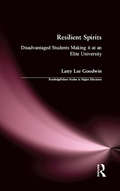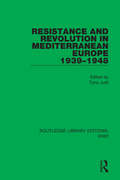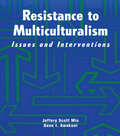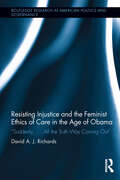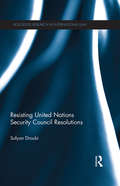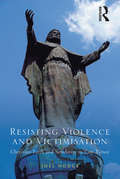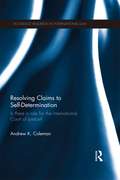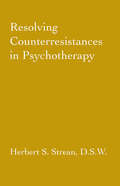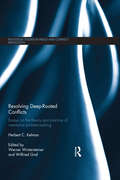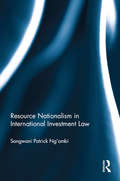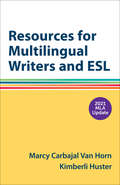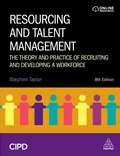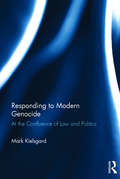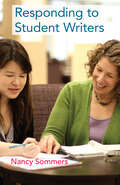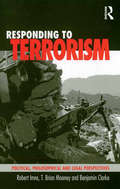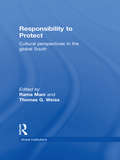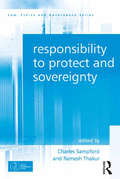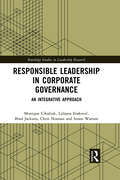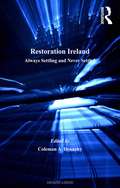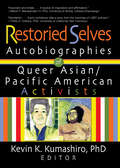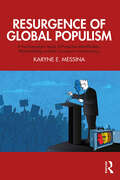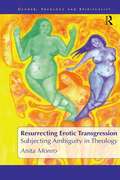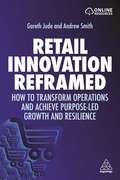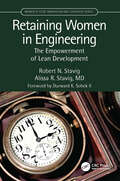Special Collections
Benetech’s Global Certified Accessible Titles
Description: Benetech’s GCA program is the first independent third-party EPUB certification to verify ebook accessibility. By creating content that is born accessible, publishers can meet the needs of all readers. Learn more: https://bornaccessible.benetech.org/
- Table View
- List View
Resilient Spirits
by Latty Lee GoodwinThis study explores the identity construction of socioeconomically and educationally disadvantaged students who enter an elite university. This critical ethnography gathered qualitative data about the twenty-three participants through non-participant observation, in-depth interviews, and focus groups. Faculty, staff, and administrators were also interviewed.
Resistance and Revolution in Mediterranean Europe 1939–1948
by Tony JudtThis book, first published in 1989, is the first general study of Communism in Mediterranean Europe during and immediately after the war. It sheds light on the origins of Europe’s Cold War East-West divide and probes the common and conflicting interests of the Soviet Union with the separate national and Communist resistance movements. It explores controversial issues including Stalin’s intentions in post-war diplomacy, Communist attitudes to Nazi collaboration in France, and the origins of the Cold War. The decade following the outbreak of the war saw the transformation of society through armed conflict, national resistance and political revolution. The relationship between resistance to Fascism and occupation, on the one hand, and profound social and political changes on the other, was especially marked in southern Europe. In France and Italy, Communist parties emerged as prominent participants in post-war governments; in Yugoslavia the Communist partisans seized full power and effected a social revolution; while a similar attempt in Greece led to a long and bitter civil war.
Resistance to Multiculturalism
by Jeffery Scott Mio and Gene I. AwakuniFirst published in 2000. Routledge is an imprint of Taylor & Francis, an informa company.
Resisting Injustice and the Feminist Ethics of Care in the Age of Obama
by David A.J. RichardsDavid A. J. Richards’s Resisting Injustice and The Feminist Ethics of Care in The Age of Obama: "Suddenly,…All The Truth Was Coming Out" builds on his and Carol Gilligan’s The Deepening Darkness to examine the roots of the resistance movements of the 1960s, the political psychology behind contemporary conservatism, and President Obama’s present-day appeal as well as the reasons for the reactionary politics against him. Richards begins by laying out the basics of the ethics of care and proposing an alternative basis for ethics: relationality, which is based in convergent findings in infant research, neuroscience, and evolutionary psychology. He critically analyzes patriarchal politics and states that they are rooted in a reactionary psychology that attacks human relationality and ethics. From there, the book examines the 1960s resistance movements and argues that they were fundamentally oriented around challenging patriarchy. Richards asserts that the reactionary politics in America from the 1960s to the present are in service of an American patriarchy threatened by the resistance movements ranging from the 1960s civil rights movements to the present gay rights movement. Reactionary politics intend to marginalize and even reverse the ethical achievements accomplished by resistance movements—creating, in effect, a system of patriarchy hiding in democracy. Richards consequently argues that Obama’s appeal is connected to his challenge to this system of patriarchy and will examine both Obama’s appeal and the reactions against him in light of the 2012 presidential election. This book positions recent American political development in a broad analysis of the role of patriarchy in human oppression throughout history, and argues that a feminist-based ethics of care is necessary to form a more humane and inclusive democratic politics.
Resisting United Nations Security Council Resolutions
by Sufyan DroubiThe United Nations Security Council has primary responsibility for maintaining international peace and security. In discharging its powers it must act in accordance with the Purposes and Principles of the UN, and observe the rules governing voting and procedure established in the Organisation’s Charter. The Council adopts mandatory resolutions that may establish obligations for members and non-members, and such obligations trump conflicting obligations originating from any other international agreement. Member States must cooperate with the Organisation and among themselves, in the implementation of any action prescribed by the Council against States whose behaviour the Council considers an act of aggression, or a threat to, or breach of, international peace and security. This book analyses resistance to Security Council resolutions and puts forward a theory of lawful resistance. Sufyan Droubi takes a positivist approach to the UN Charter regarding it as a constitution. Special emphasis is placed on the construction of the Charter’s meaning through the practice of both organs and Members of the UN and on the need to enhance the effectiveness of the Organization with due respect to the rule of law. The book proposes that nonviolent resistance to a mandatory resolution of the Security Council, on grounds that the latter is incompatible with the Charter or jus cogens norms, may be considered lawful under the Charter if some elements are present. In exploring a number of case studies of individual and collective State resistance to mandatory Council resolutions, the book proposes that resistance may function as a rudimentary instrument of accountability and protection of the Charter and jus cogens, in the absence of more mature mechanisms of judicial review. The book will be of excellent use and interest to scholars and students of constitutional international law and international relations.
Resisting Violence and Victimisation
by Joel HodgeThe reality and nature of religious faith raises difficult questions for the modern world; questions that re-present themselves when faith has grown under the most challenging circumstances. In East Timor widespread Christian faith emerged when suffering and violence were inflicted on the people by the state. This book seeks a deeper understanding of faith and violence, exploring how Christian faith and solidarity affected the hope and resistance of the East Timorese under Indonesian occupation in their response to state-sanctioned violence. Joel Hodge argues for an understanding of Christian faith as a relational phenomenon that provides personal and collective tools to resist violence. Grounded in the work of mimetic theorist René Girard, Hodge contends that the experience of victimisation in East Timor led to an important identification with Jesus Christ as self-giving victim and formed a distinctive communal and ecclesial solidarity. The Catholic Church opened spaces of resistance and communion that allowed the Timorese to imagine and live beyond the violence and death perpetrated by the Indonesian regime. Presenting the East Timorese stories under occupation and Girard's insights in dialogue, this book offers fresh perspectives on the Christian Church's ecclesiology and mission.
Resolving Claims to Self-Determination
by Andrew ColemanSince the end of World War Two and the formation of the UN, the nature of warfare has undergone changes with many wars being ‘intra-state’ wars, or wars of secession. Whilst wars of secession do not involve the same number or type of combatants as in the last two World Wars, their potential for destruction and their danger for the international community cannot be underestimated. There are currently many peoples seeking independence from what they perceive as foreign and alien rulers including the Chechens, West Papuans, Achenese, Tibetans, and the Kurds. The break-up of Yugoslavia and the former USSR, together with recent conflicts in South Ossetia, reveal that the potential for future wars of secession remains high. This book explores the relationship between recognition, statehood and self-determination, and shows how self-determination continues to be relevant beyond European decolonisation. The book considers how and why unresolved questions of self-determination have the potential to become violent. The book goes on to investigate whether the International Court of Justice, as the primary judicial organ of the United Nations, could successfully resolve questions of self-determination through the application of legal analysis and principles of international law. By evaluating the strengths, weaknesses and effectiveness of the Court’s advisory jurisdiction, Andrew Coleman asks whether the ICJ is a suitable forum for these questions, and asks what changes would be necessary to provide an effective means for the peaceful "birth" of States.
Resolving Counterresistances In Psychotherapy
by Herbert S. StreanFirst published in 1993. Routledge is an imprint of Taylor & Francis, an informa company.
Resolving Deep-Rooted Conflicts
by Herbert C. KelmanThis book is a collection of articles and essays by Professor Herbert C. Kelman, a leading figure in the conflict resolution community and one of the most influential peace researchers. Professor Kelman, a social psychologist, has been a pioneer of conflict resolution and peace research, and his work in conflict resolution has included a decades-long action research program on the Arab-Israeli conflict which has seen the development of Interactive Problem-Solving Workshops, an approach which has had a deep impact not only on research, but also on the practice of conflict resolution around the world, and especially in the Middle East. Focusing on Kelman’s conflict resolution-related work, this volume comprises an important collection of articles written by Kelman across his career as academic and practitioner. By bringing together these carefully selected articles the book offers a concise overview of the body of Kelman’s work and his intellectual biography. It traces the origins of the field of conflict resolution, the development of the study and practice of Interactive Problem Solving Workshops, and the wider challenges faced by conflict resolution research and practice. This book will be of much interest to students of peace and conflict studies, conflict resolution, psychology and IR in general.
Resource Nationalism in International Investment Law
by Sangwani Patrick Ng’ambiForeign direct investment in the natural resource industries is fostered through the signing of concession agreements between the host State and the investor. However, such concessions are susceptible to alteration by the host State, meaning that many investors now require the insertion of stabilization clauses. These are provisions that require the host State to agree that they will not take any administrative or legislative action that would adversely affect the rights of the investor. Arguing that it is necessary to have some form of flexibility in concession agreements while still offering protection of the legitimate expectations of the investor, Resource Nationalism in International Investment Law proposes the insertion of renegotiation clauses in order to foster flexible relationships between the investor and the host State. Such clauses bind the parties to renegotiate the terms of the contract, in good faith, when prevailing circumstances change. However these clauses can also prove problematic for both State and investor due to their rigidity. Using Zambia as a case study, it highlights the limitations of the efficient breach theory to emphasise the need for contractual flexibility.
Resources for Multilingual Writers and ESL with 2021 MLA Update
by Diana Hacker and Nancy Sommers and Kimberli Huster and Marcy Carbajal Van HornThis ebook has been updated to provide you with the latest guidance on documenting sources in MLA style and follows the guidelines set forth in the MLA Handbook, 9th edition (April 2021).This supplement both resident and international students understand college expectations and develop strategies for improving their academic English and academic writing. Written by an ESL expert, Resources for Multilingual Writers and ESL includes plenty of helpful charts, activities, exercises, and model papers — along with notes about where to find additional resources online and on campus.
Resourcing and Talent Management
by Stephen TaylorAn essential textbook for the CIPD Level 7 module in Resourcing and Talent Management which covers the recruitment, selection and retention of staff as well as employee retirement, dismissals and redundancy.Resourcing and Talent Management provides broad and accessible coverage of key topics for HR masters students and is the essential companion for the CIPD Level 7 module of the same name. It covers everything from job design and both internal and external recruitment through to interviewing, selection and contracts of employment. There is also guidance on staff retention, succession planning, employee turnover as well as crucial information on how staff leave the business whether this is retirement, redundancy or dismissal.This new edition of Resourcing and Talent Management now includes a brand new chapter on managing absence as well as new content on the UK labour market outside the EU and the implications of Brexit on recruitment and staff development, Fully updated throughout and aligned to the new CIPD qualification framework, this textbook includes 'explore further' boxes to encourage students to read more deeply, 'pause for thought' boxes to encourage reflection on learning and activities to put their learning in practice and test their understanding.
Responding to Modern Genocide
by Mark D. KielsgardDevelopments in the understanding and treatment of genocide through the twentieth century have involved a combination of politics, public opinion, social trends, and economic development, and led to the substantive law of genocide and the assumption of international jurisdiction. This book analyzes incidences of genocide and mass atrocities, focusing on the political factors involved in modern counter-genocide efforts. Drawing on incidences of genocide and mass atrocity such as the Holocaust, the Rwandan genocide, and the Armenian genocide, Mark Kielsgard adopts a conceptual model that reveals the political factors which impact the international law of genocide, such as barriers and catalysts to transitional justice and the politics of genocide denial. As a work which provides a focused picture of those influences and their significance to genocide studies, this book will be of great use and interest to students and researchers in international criminal law, conflict studies, and conflict resolution.
Responding to Student Writers
by Nancy SommersOffering a model for thinking about response as a dialogue between students and teachers, Responding to Student Writers is a brief instructor resource which gets you thinking about the benefits of responding to writers and their writing.
Responding to Terrorism
by Robert Imre and T. Brian MooneyTerrorism and political violence as a field is growing and expanding. This volume provides a cross-disciplinary analysis - political, philosophical and legal - in a single text and will appeal to readers interested in studying this phenomenon from all perspectives. The volume covers the full spectrum of issues, including torture, terrorism causes and cures, legal issues, globalization and counter-terrorism. The authors bring their individual specialities to the fore in a concise and easy to follow format. Comprehensive and well informed, Responding to Terrorism will appeal to a variety of disciplines including sociology, politics, security studies, philosophy, international law and religious studies. The originality of the volume makes it a valuable addition to any college or university library and classroom.
Responsibility to Protect
by Thomas G. Weiss and Rama ManiThis volume explores in a novel and challenging way the emerging norm of the Responsibility to Protect (R2P), initially adopted by the United Nations World Summit in 2005 following significant debate throughout the preceding decade. This work seeks to uncover whether this norm and its founding values have resonance and grounding within diverse cultures and within the experiences of societies that have directly been torn apart by mass atrocity crimes. The contributors to this collection analyze the responsibility to protect through multiple disciplines—philosophy, religion and spirituality, anthropology, and aesthetics in addition to international relations and law—to explore what light alternative perspectives outside of political science and international relations shed upon this emerging norm. In each case, the disciplinary analysis emanates from the global South and from scholars located within countries that experienced violent political upheaval. Hence, they draw upon not only theory but also the first-hand experience with conscience-shocking crimes. Their retrospective and prospective analyses could and should help shape the future implementation of R2P in accordance with insights from vastly different contexts. Offering a cutting edge contribution to thinking in the area, this is essential reading for all those with an interest in humanitarian intervention, peace and conflict studies, critical security studies and peacebuilding.
Responsibility to Protect and Sovereignty
by Ramesh ThakurThe responsibility to protect ('R2P') principle articulates the obligations of the international community to prevent conflict occurring, to intervene in conflicts, and to assist in rebuilding after conflicts. The doctrine is about protecting civilians in armed conflicts from four mass atrocity crimes: genocide, war crimes, crimes against humanity and ethnic cleansing. This book examines interventions in East Timor, Sri Lanka, Sudan and Kosovo. The chapters explore and question UN debates with respect to the doctrine both before and after its adoption in 2005; contrasting state attitudes to international military intervention; and what takes place after intervention. It also discusses the ability of the Security Council to access reliable information and credible and transparent processes to enable it to make a determination on the occurrence of atrocities in a Member State. Questioning whether there is a need to find a closer operational link between the responsibilities to prevent and react and a normative link between R2P and principles of international law, the contributions examine the effectiveness of the framework of R2P for international decision-making in response to mass atrocity crimes and ask how an international system to deal with threats and mass atrocities can be developed in the absence of a central authority. This book will be valuable to those interested in international law, human rights, and security, peace and conflict studies.
The Responsibility to Protect in International Law
by Susan BreauThis book will consider a rapidly emerging guiding general principle in international relations and, arguably, in international law: the Responsibility to Protect. This principle is a solution proposed to a key preoccupation in both international relations and international law scholarship: how the international community is to respond to mass atrocities within sovereign States. There are three facets to this responsibility; the responsibility to prevent; the responsibility to react, and the responsibility to rebuild. This doctrine will be analysed in light of the parallel development of customary and treaty international legal obligations imposing responsibilities on sovereign states to the international community in key international law fields such as international human rights law, international criminal law and international environmental law. These new developments demand academic study and this book fills this lacuna by rigorously considering all of these developments as part of a trend towards assumption of international responsibility. This must include the responsibility on the part of all states to respond to threats of genocide, crimes against humanity, ethnic cleansings and large-scale war crimes. The discussion surrounding aggravated state responsibility is also explored, with the author concluding that this emerging norm within international law is closely related to the responsibility to protect in its imposition of an international responsibility to act in response to an international wrong. This book will be of great interest to scholars on international law, the law of armed conflict, security studies and IR in general.
Responsible Leadership in Corporate Governance
by Brad Jackson and Chris Noonan and Susan Watson and Monique Cikaliuk and Ljiljana ErakovicResponsibly led boards of directors make it possible for modern companies to survive and prosper under conditions of change. Despite the importance of boards of directors, their activities are often lionised or vilified by shareholders and stakeholders which obscures how boards enact responsible leadership. Responsible Leadership in Corporate Governance: An Integrative Approach introduces an integrative model of responsible leadership in governance that positions the board as a nexus of all corporate participants. In this model, responsibly led boards seek to make decisions in the best interests of the modern company as an entity that operates in a dynamic business environment. This book provides a timely focus on in-depth cases of board led responsible leadership. Examining boards of directors in listed companies, state-owned enterprises, and private companies, the book connects insights from corporate governance and leadership to behaviours that affect boards’ relationships with shareholders and stakeholders. In addition, these insights underscore key requirements and challenges of responsible leadership in governance: from the importance of purpose and the crucial role of value creation to the difficulties of ownership transition and accountability. Far-sighted and experienced-based, this book will not only help students connect to real world situations but also will benefit those that interact with and support boards of directors.
Restoration Ireland
by Coleman A. DennehyIn recent decades, the historiography of early modern Ireland in general, and of the seventeenth century in particular, has been revitalised. However, whilst much of this new work has focused either on the critical decades of the 1640s or the Williamite wars, the Restoration period still remains largely neglected. As such this volume provides an opportunity to explore the period between 1660 and 1688, and reassess some of the crucial events it witnessed. For whilst it may lack some of the high drama of the Civil War or the Glorious Revolution, this was a time that established a political and social settlement, based upon the maintenance of the massive land confiscations of the 1650s, that would underpin the social and class structure of Ireland until the end of the nineteenth century. Including contributions from both established and younger scholars, this collection provides a set of interlocking and interrelated essays that focus on the central concerns of the volume, whilst occasionally reaching beyond the chronological and thematic barriers of the period as required. The result is a homogenous volume, that not only addresses a glaring historiographical gap in critical areas of the Restoration period; but also serves to take stock of the work that has been done on the period; and as a consequence of this it will help stimulate and provoke further argument, debate, and research into the history of Ireland during the Restoration period. Directed primarily at an academic audience, this collection will be useful to a range of scholars with an interest in seventeenth century political, social and religious history.
Restoried Selves
by Kevin KumashiroRestoried Selves: Autobiographies of Queer Asian / Pacific American Activists presents the first-person accounts of 20 activistslife stories that work against common stereotypes, shattering misconceptions and dispelling misinformation. These autobiographies challenge familial and cultural expectations and values that have traditionally forced queer Asian / Pacific Americans into silent shame because of their sexual orientation and/or ethnicity. Authors share not only their experiences growing up but also how those experiences led them to become social activists, speaking out against oppression. Many harmful untruthsor storiesabout queer Asian-Pacific Americans have been repeated so often, they are accepted as fact. Restoried Selves: Autobiographies of Queer Asian / Pacific American Activists provides a forum for voices often ignored in academic literature to re-story themselves, addressing a range of experiences that includes cultural differences and values, conflicts between different generations in a family or between different groups in a community, and difficulties and rewards of coming out. Those giving voice to their stories through narrative and other writing genres include the transgendered and intersexed, community activists, youths, and parents. The stories told in Restoried Selves: Autobiographies of Queer Asian / Pacific American Activists reflect on: personal experiencesbased on country of origin, educational background, religion, gender, and age populations served by activism, including the working poor, immigrants, adoptees, youth, women, and families different arenas of activism, including schools, governments, social services, and the Internet issues targeted by activism, including affirmative action, HIV/AIDS education, mental health, interracial relationships, and sexual violence institutions in need of change, including legal, religious, and educational entities and much more! Restoried Selves: Autobiographies of Queer Asian / Pacific American Activists is an essential read for academics and researchers working in Asian American studies, ethnic studies, gender studies, and queer studies, and for LGBTQ youth and their parents, teachers, and social service providers.
Resurgence of Global Populism
by Karyne E. MessinaResurgence of Global Populism provides a psychoanalytic perspective to the global implications of the populist movement in the U.S. and its relationship to other parts of the world, particularly focusing on the presidency and legacy of Donald Trump. The book explores Trump’s use of psychological form of manipulation known as projective identification and how his use of this defense mechanism has influenced global institutions, political discourse, and quality of life in the long term. Messina explores the correlation between Trump’s rhetoric and an increase in reported racism and prejudiced violence worldwide, disintegration of global values, and a radicalized political climate. She analyzes the dynamics between Trump and his supporters, political opponents, and successors, considers the COVID-19 pandemic as a study of Trump’s views of the world, and considers the roles of social and television media. The book concludes with an explanation of antidotes to projective identification, including thoughtful debate and meaningful discussions and scripted dialogues for global healing. This insightful book will be of interest to psychoanalysts and psychotherapists, academics and students of political psychology and political movements, and readers interested in a deeper analysis of populism and political dynamics.
Resurrecting Erotic Transgression
by Anita Monro'Resurrecting Erotic Transgression' presents a feminist theological methodology based on the work of Julia Kristeva. This methodology provides the means for 'subjecting ambiguity', bringing to theology a recognition of the multiplicity of language and identity. A method of 'poetic reading' is proposed with a three stage process: articulation of the dualities present in and around a focal discourse; subversion of these dualities through a range of strategies; and the re-presentation of the discourse emphasising its ambiguous nature. The hermeneutical method of 'poetic reading' is explored in relation to three biblical texts and an image of the 'otherness' of God as whore.
Retail Innovation Reframed
by Andrew Smith and Gareth JudeRetail is defined by disruption; companies either adapt or are replaced by those that will. More so than ever learning how to reframe your business, apply change and stay innovative is key to continued success and survival. Innovation is hard for any organization, even more so for retailers where executing retail basics can often be seen as enough. But the difference between success and failure is increasingly becoming the ability to reframe your approach to innovation and use it to win the competitive edge, as Retail Innovation Reframed explains. Changing your business operations to solve customers' biggest challenges is how established household names and emerging businesses now thrive.Featuring case studies including Walmart, Warby Parker, Starbucks and Amazon, Retail Innovation Reframed demonstrates how to weave innovation into the operating fabric your company to remain ahead of the curve. Start your journey to innovation and learn how to use change to succeed. Online resources include templates for testing and analyzing new innovations.
Retaining Women in Engineering
by Robert N. Stavig and Alissa R. StavigDiversity drives better business results; however, despite decades of effort, women make up only 15% of engineers. Retaining Women in Engineering: The Empowerment of Lean Development approaches the problem of women leaving engineering from a systems-level perspective to change the way engineering is done and level the playing field between men and women. This book utilizes the six principles of Lean Development and draws from the learnings of the field of medicine, recognizing that access to a vast amount of written knowledge is an important part of a physician’s learning process. Using these principles, the book provides leaders with concrete strategies and methods to change the way engineering is done and learning occurs. Integrated within the book are "gray box stories" which describe two different worlds that engineers work in: that of traditional development and that of Lean Development. These stories underscore the way that the gender confidence gap, bias, and stereotypes affect a female engineer’s career. Additionally, the book highlights how the methods of Lean Development strengthen an individual’s ability to control their learning and career, and a leader’s ability to coach others more effectively. Ultimately, this results in more capable teams. Furthermore, not unlike the marine chronometer (a clock) which solved the centuries old challenge of establishing the longitudinal location for a ship at sea, this book finds the "clock" that levels the playing field between men and women. This book will help leaders at every level within an engineering firm, as well as women engineers and managers who want to grow to their full potential, and others who care about gender equity.
